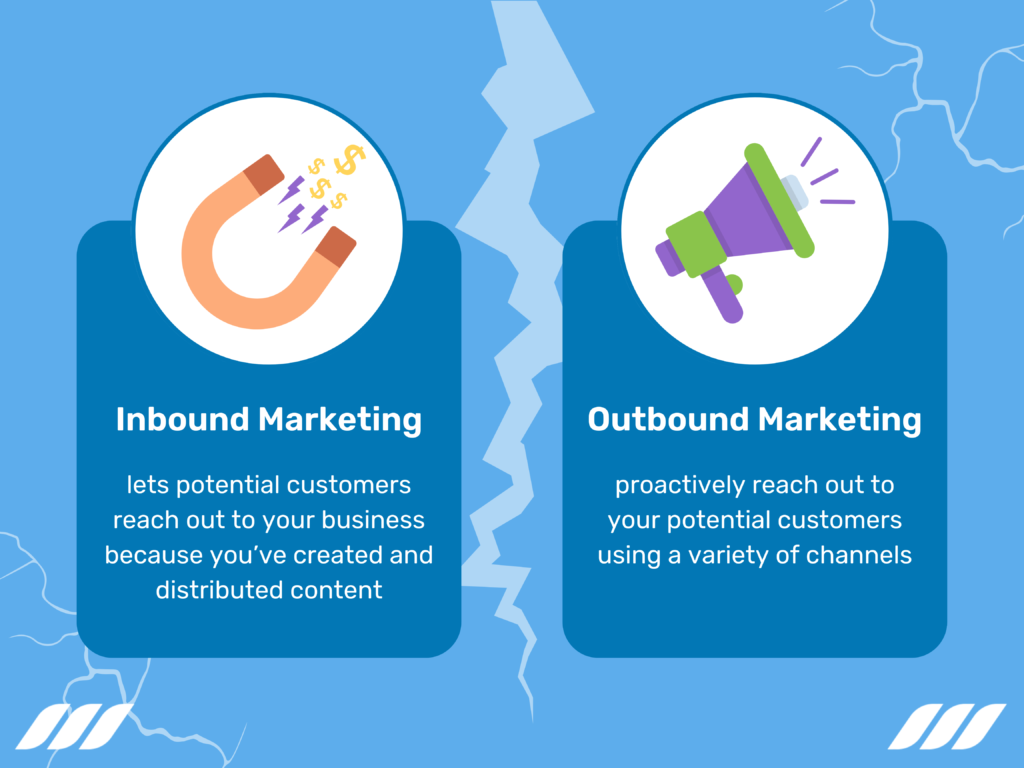Are you worried about reaching and engaging potential customers for your service-based business? Fret not; you’re just about to discover a powerful approach that can help you expand your client base and boost your growth!
Outbound Marketing for Service-Based Businesses is a comprehensive methodology that actively pursues new customers through an array of direct channels, including traditional and digital strategies like cold emailing, direct mail, seminars, advertisements, and many more.
Why not continue to explore this blog post? You’ll uncover invaluable insights into Content Marketing, SEO, Social Media Engagement, Influencer Partnerships, and Email Marketing, all designed to enhance your outbound marketing efforts and lead generation.
Understanding Outbound Marketing for Service-Based Businesses
Outbound marketing is a comprehensive methodology that actively pursues new customers through various direct channels, including traditional and digital strategies like cold emailing, direct mail, seminars, advertisements, and more. It differs from inbound marketing, which passively attracts potential customers by earning their attention through valuable content and experiences tailored to their needs and interests (Alyce). Outbound marketing is essential for businesses looking to expand their client base beyond passive engagement methods and drive growth.
In this blog post, we’ll delve deeper into outbound marketing for service-based businesses and provide you with valuable insights and actionable strategies on content marketing and search engine optimization (SEO) to enhance your outreach efforts and lead generation.
Content Marketing: Creating Valuable Connections
A strategic content marketing plan can help your service-based business establish credibility, build trust with your audience, and position you as an industry leader and expert. By focusing on producing high-quality, informative content, you can create valuable connections with potential customers, driving organic traffic and generating leads.
Content marketing involves publishing a variety of content formats targeting your audience’s needs and interests, including:
- Blog posts
- Whitepapers
- Case studies
- Videos
- Infographics
- Podcasts
The key to a successful content marketing strategy is consistency, relevance, and quality. This not only helps improve your organic visibility, but it also creates an engaged audience eager to consume and share your content (LinkedIn). Regularly publishing valuable content on different platforms and keeping it contextually relevant is essential.
Search Engine Optimization (SEO): Dominating Organic Search Results
SEO is crucial to improve organic visibility and drive traffic to your website, without relying on paid advertising. The primary goal of SEO is to ensure that your content appears at the top of search engine results pages (SERPs) when users search for keywords related to your service offerings. By focusing on keyword research, on-page optimization, and building a reputable backlink profile, you can secure higher rankings on search engines and drive more qualified leads.
Understanding the search intent of your target audience is critical for successful SEO efforts. Focusing on long-tail keywords that convey a specific intent can help you accurately align your website content with the user’s needs and increase the likelihood of conversion.
Another essential aspect of SEO is creating a comprehensive backlink profile, which directly influences your website’s domain authority and credibility. Building high-quality backlinks from reputable sources helps search engines perceive your website as an authority in your niche, resulting in better search rankings. Guest posting and collaborating with industry influencers are effective ways to earn valuable backlinks.
As SEO continues to evolve, machine-learning algorithms and continuous updates to search engine ranking factors make it essential for businesses to stay up-to-date with the latest trends and best practices. Incorporating these insights into your SEO strategy can significantly boost your online presence and lead generation.
Remember, search engines prioritize user experience when determining rankings. Therefore, ensuring your website’s accessibility, mobile-friendliness, and page load speed play a vital role in the success of your SEO efforts. Also, don’t forget to optimize your content, metadata, and URLs to align with your target keywords.

Source: MakeWebBetter
In conclusion, outbound marketing for service-based businesses requires a strategic approach that includes content marketing and SEO as essential components. By producing high-quality, relevant content and optimizing your website for search engines, you can effectively expand your client base, engage with your audience, and foster meaningful connections. It’s important to keep up with the latest industry trends and best practices to stay ahead of the competition and maximize your marketing ROI. Now, it’s time to put these strategies into action and reap the rewards of an effective outbound marketing campaign.
Social Media Engagement: Building an Online Community
In today’s digital landscape, social media platforms have transformed into a goldmine for organic interactions and building communities around a brand. A robust social media strategy is essential not only for increasing brand authority but also for forging meaningful connections with the target audience. Actively participating in relevant online discussions and community groups can significantly enhance brand presence and boost lead generation efforts for service-based businesses.
One of the key elements of a successful social media strategy is to ensure a consistent brand voice across different platforms. Sharing high-quality content, initiating conversations, and promptly responding to questions and comments can drive engagement and foster a sense of loyalty among followers. With 3.6 billion users worldwide and counting, social media has become an indispensable component of modern outbound marketing efforts.
Influencer Partnerships: Leveraging Trust and Authority
Influencers have mastered the craft of creating persuasive content and cultivating a loyal following, making them a lucrative marketing asset for service-based businesses. Collaborating with influencers can tap into their extensive follower base and garner qualified leads predisposed to engagement. As these influencer recommendations carry weight due to the trust they’ve established with their audience, identifying the right partnerships can yield substantial organic growth without significant ad spend.
According to Business Insider, the global market for influencer marketing is projected to reach $13.8 billion in 2021, a testament to the power and relevance of influencer partnerships today. Selecting influencers whose values and content align with your brand can enhance credibility and encourage audience members to explore your services further.
Email Marketing: Nurturing Relationships for Better Conversions
Far from being obsolete, email remains a powerful outbound marketing tool. Personalized email campaigns can significantly improve customer relationship nurturance and boost conversions. By implementing segmentation and targeted content delivery based on customer behavior and preferences, businesses can enhance the overall effectiveness of their email marketing strategies.
Incorporating creative incentives within emails, such as providing exclusive discounts or content, can stimulate customer referrals and word-of-mouth promotion. In fact, one study by Campaign Monitor found that email marketing provides an average return on investment of 4400% – a statistic that highlights the importance of nurturing relationships via email for better conversion rates.
Conclusion
Outbound marketing for service-based businesses requires a multi-dimensional approach that combines content marketing, SEO, social media engagement, influencer partnerships, and email marketing strategies. By understanding and utilizing these core concepts, businesses can reach and engage with potential customers, ultimately driving growth.
Frequently Asked Questions
How do I determine the right influencers to partner with for my service-based business?
When selecting influencers to partner with, consider factors such as their reach, engagement, audience demographics, and content alignment with your brand values and goals. Conduct due diligence by analyzing their social media presence, engagement metrics, and sponsored content history to gauge whether they are an ideal fit for your business.
What types of content should I create for social media engagement in my service-based business?
Depending on your target audience and business goals, content types for social media platforms can include blog posts, infographics, videos, polls, and much more. It is crucial to consistently share high-quality content that resonates with your followers, encourages engagement, and fosters trust.
How can I track the success of my email marketing campaigns for my service-based business?
Monitoring email open rates, click-through rates, and conversion rates are key performance indicators for gauging the effectiveness of your email marketing campaigns. Analyzing and optimizing these metrics can help you refine your strategy for better results.
What is the optimal frequency for sending marketing emails to my service-based business subscribers?
There is no one-size-fits-all answer to the optimal email frequency, as it largely depends on factors such as your subscribers’ preferences, email content, and business goals. It is crucial to test various sending frequencies and analyze your audience’s engagement patterns to determine the optimal cadence that balances value and relevance while minimizing unsubscribes.
I’ve just started my service-based business, and my budget is tight. Which outbound marketing strategies should I prioritize?
Start by focusing on cost-effective strategies, such as content marketing and social media engagement. These approaches can help you build credibility and foster relationships with your target audience while working within budget constraints. As your business and budget grow, consider implementing more robust strategies like email marketing and influencer partnerships to drive further growth.



